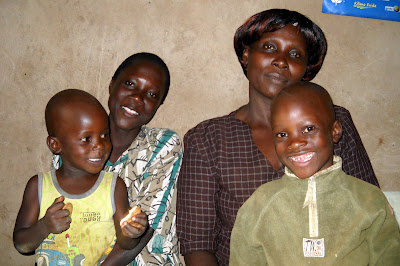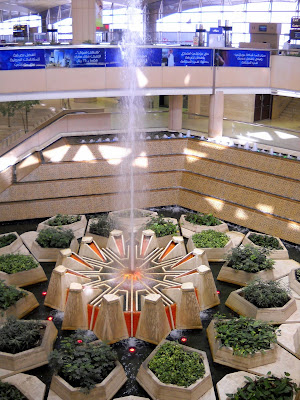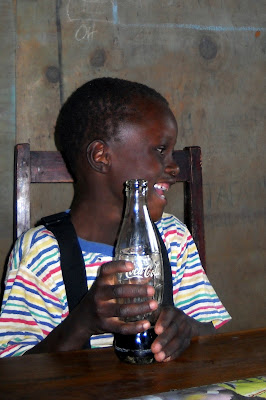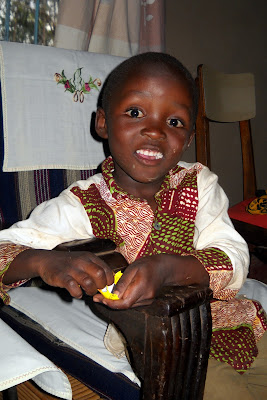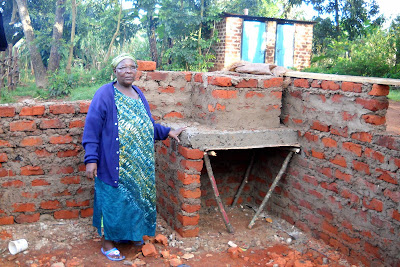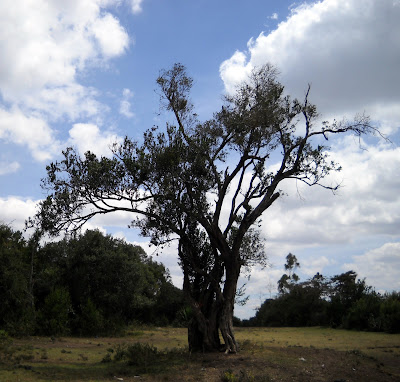Seven years ago, on Thanksgiving Day, I had the incredible and unforgettable experience of assisting in the birth of a child. It took place in a mud house - with a mud floor - in a remote rural village in Kenya.
He's called Duane - after my dad!
I am still good friends with Agnes, Duane's mom. God is teaching me how to be her "neighbor" and how to love her with His love!
Just as a side-note, before you read the story... Over the past couple of years, God developed in me the idea to raise money - from people like you - to help change the life of this struggling family.
Will you consider joining with me to buy her a plot of land so she can raise her own crops and support her 5 boys? Please click here to learn about the details. As of today, we've raised almost $5,000 on our way to $12,000!
In the photo above, Duane is the one on Agnes' lap. Popino (her second-oldest son) is holding Caleb Zachary (who is named after my two grown sons).
I believe you'll enjoy reading the story below. I've watched God orchestrate some pretty amazing experiences in the 10 years I've been a missionary in Kenya. It all started when I surrendered to His calling on my life. This story recounts one of those amazing experiences.
A Thanksgiving Baby - Thursday, November 25, 2004
I met Charles Cheloti during the first week of September. He and his family - a pregnant wife, Tony (11), Pope (9), and Anderson (6) - were my new next-door neighbors at my Matunda place. To be frank, initially their requests for such things as kerosene, matches, sugar, and cooking oil mildly irritated me. But, something about the family really touched me. Obviously they were in dire need; I couldn’t refuse.
In late October, I was as happy to see Charles and the boys again as they were to see me. The language barrier prevents me from communicating too well with the boys but as I pedaled onto the compound, their huge grins spoke volumes. It was during this visit that I first met Agnes, Charles’ wife. I liked her immediately. (She had been bed-ridden for much of her pregnancy and I hadn’t even seen her before.)
When I left to return to Nairobi on the 2nd of November, she said, “Now Deb, who is going to be with me when this baby comes? It should come any day now. This pregnancy has had me ill the entire time. I fear giving birth alone.” I reassured her she would be just fine. Secretly I wished I could, in fact, be with her when that moment arrived. Almost three weeks later - on the 21st - I saw my friend, Margaret. She had just come back from Matunda and responded negatively when I inquired, “Is there a baby yet?” I was surprised, but held out hope that maybe I could share in the event after all. I was to travel to Matunda the following day.
That evening, it rained heavy for two hours. I went to bed at 9:30 and was quickly asleep. A short time later I awoke to voices. I heard someone praying and singing. I roused myself out of bed and peeked out the window. It was Charles, Agnes, and a neighbor lady. Apparently it was time!
I threw on my sweatshirt and joined them; it was midnight. Agnes lay on a gunnysack on the cold crumbling cement floor, leaning against a rolled-up foam mattress. She was indeed in labor. Agnes told me that Charles had first tried to wake me but unsuccessful, he'd gone for Mary John who lives about a 10-minute walk away. At their request I retrieved a razor blade; Mary got some thread from somewhere. Charles woke the boys and got them settled in the other tiny house on the compound. As he did so, Agnes laughed, “If they hear my groans and noises they’ll mimic me for a week!”
Throughout the next few hours, and in-between the incessant rain showers, I brought my lantern and small tin lamp, as well as my flask of leftover tea for Agnes. Charles tried to light some maize cobs. They weren’t dry enough from the recent harvest; the ensuing smoke made it difficult for Agnes to breathe. He opened the windows to let the smoke out but the cool night air made Agnes cold. I walked the few feet to my house and got my 'jiko' (a small charcoal cooker), as theirs was falling apart. I also grabbed some of my charcoal. Eventually the house warmed.
In between her contractions we engaged in lively conversation. We told stories; we laughed. During their narrations, about every ten minutes or so, Agnes would disengage in the conversation and endure a contraction. Immediately afterwards she would join back in with us.
Charles added, “You know – God’s ways are not human’s ways. People can say one thing, but God has higher ways. God is power.” Charles, only educated to fifth grade, talks in broken and halting English but all the same, he can be quite eloquent in my estimation.
Circumcision revelers (across the river in the Mawe Tatu area) loudly serenaded us for quite some time. It continued to rain off and on. We all grew tired; the conversation began to wane. “Charles, tell us some stories to entertain us,” Agnes pleaded. The crickets counted the passing minutes. My back grew stiff and sore from sitting on a bench. Mary sat on a small box on the floor. In between doing whatever needed to be done, Charles laid down on their mattress on the floor.
Strong and enduring the pain and discomfort like a real trooper, Agnes began to get weary. She wondered out loud if this baby would ever come. I went to get my phone to check the time - 3:07am. Mary suggested we find a vehicle to take her to the clinic. While she was out, Agnes confided to me that she saw no need to go to the clinic. “Now, what for? Where will we find one? Anyway, I still have hope.” I boldly interjected on Agnes’ behalf that it didn’t seem necessary.
Instead a decision was reached to try to summon a midwife in the area. One had already refused because of the unavailability of gloves. Charles headed out to try another one in the other direction. I went for my 'torch' (flashlight) and loaned it to Charles. The contractions were coming about five minutes apart and Agnes now pushed with each one. “Can you imagine a woman going through all this pain only to abandon her child? This is too much work,” she asserted. Mary and I helped her walk around the house now and then. Even though she never really complained, it was apparent to me that she was worn out.
An hour passed; still no baby. Agnes “soldiered on” (as a Kenyan would say) but it was an agonizing wait for her. I noticed roosters in the area starting their morning ritual of announcing the approaching dawn. When Charles finally came back, he informed us that the second midwife had also refused to assist without gloves and without being paid in advance. Agnes was disappointed, proclaiming that was a silly reason not to help someone in need. I had admired her spirited courage all night.
A few minutes later, after another couple of strong pushes with no baby, she stood up noticeably frustrated and exhausted. Wrapping her blanket around her shoulders she announced, “I’m walking to the midwife down the hill here - even if I die at her door!” I reminded her that earlier the woman had refused to help. “When she sees my condition, now how can she refuse?” Mary asked her how she would make it with no vehicle. “I’ll just go ‘poly poly’ (slowly). This baby has delayed too long!”
Charles grabbed the flashlight; he and Mary assisted Agnes on each side. I was a bit stunned by the decision and stood transfixed in the doorway. I knew Agnes was exhausted. They had gone a mere ten steps when Agnes moaned, squatted, and let out a scream.
The next sound in the still dark night was the cry of a baby!
Immediately I scooped him up off of the cold wet grass and held him in my arms to keep him warm. Charles supported his wife; Mary ran for the lantern. We tried to get her back in the house. It was awkward, though, as I had to walk too close to her with the umbilical cord still attached.
She moaned again and Charles lowered her. As I simultaneously squatted back down alongside her, a big squirt of blood landed on my foot. Mary placed a gunnysack underneath to catch the placenta, which quickly followed. Charles then led Agnes into the house. Mary and I followed with the baby in my arms and Mary carrying the gunnysack.
Once inside, Mary fumbled around nervously trying to tie the cord. I helped as best I could by holding his curled up legs away. Having completed its 9-month task, I noticed the cord was already cold to the touch. It felt strange. Mary was ready to cut it when I noticed she hadn’t tied the thread nearly tight enough. Eventually she completed the task of retying it and I resumed my seat on the bench. We discussed what should be done with the afterbirth. Finally, with his 'jembe' (hoe), Charles dug a hole near the house and Mary helped him bury it.
Meanwhile Agnes and I marveled at the way things had developed. I checked my phone; he’d been born at 4:30am. I informed her that the baby looked just like Charles. Too tired to really care, she was relieved it was over.
I couldn’t take my eyes off the child in my arms. I had the privilege of holding him for the first full hour of his life. How unreservedly incredible! Content and with a full head of curly black hair, he was simply beautiful. With eyes bright and alert, he looked around at his new environment. “Karibu Kenya. Kula ugali,” "Welcome to Kenya. Eat 'ugali' (Kenya's staple food." I announced it to the babe in my arms and to everyone’s delight.
Charles continued to praise God about the course of the last couple of days. “You know, God’s a power! His ways are not like human’s. God’s a miracle. Look at this baby. God is a miracle.” He laughed with joy.
“Deb, it’s for you to name this child,” declared Agnes. “If it had been a girl she was to be called Deb. But I’m not prepared to name a boy. It seems God only wants me to have boys.” As I hesitated for a moment considering what name to choose, suddenly Charles asked, “Sister, what is your father’s name? I think you must have the same character as your father. You’re so kind. I want my son to have that same character.”
I told them his name was Duane. “Then that’s the name of this boy - Duane,” proclaimed Agnes. They’d never heard of the name and are quite sure there’s none in all of Kenya. But regardless of that, they accepted the name immediately.
As we continued to muse over the child’s birth, I told them that today was Thanksgiving in America. I explained it’s a day set aside to give thanks to God for all of our blessings. “Duane not only has an American name, he was born on an American holiday!” I suggested that Charles pray and give thanks to God for this new little one. Instead, he insisted that I be the one to pray. As I offered thanksgiving to God for the miracle I held in my arms, emotion flooded over me; I was barely able to hold back my tears.
As the sun began to bring the night to a close, Mary got up to leave and Charles gave her a “push” home. I sat down next to where Agnes lay on the floor and laid Duane by her side. I brought the tin lamp over close so she could see him for the first time. As I did so, she noticed the blood on my sweatshirt. “Never mind that; I can wash it. Agnes, here take a look at your son.” We visited some more, still marveling at the birth.
When Charles returned, I went to draw water from the well in order to wash my bloodstained sweatshirt. The sun had just come up over the horizon revealing a thick fog across the valley. It was a beautiful morning - the dawn of a new day. Charles met me coming back with my bucket of water. “Sister, we have a problem. Can you come?”
I went back in the house to find Agnes looking at the umbilical cord. “Deb, I don’t think Mary tied this right. Look, he’s still bleeding. This rag is all covered in blood and that-s why your jacket is bloody. He can bleed to death.” “Wow,” I said, “it needs to be retied.” Charles handed me the thread. Incredulous, I asked, “You want me to do it?”
As I bravely tied it as tightly as I could manage, Agnes whispered to me in amazement, “I’ve never done that before.” I told her that I never had either I! I got my scissors and re-cut the cord. She wrapped Duane in some clean pieces of cloth. I took the bloody and mucous-covered rags and washed them along with my sweatshirt.
A few hours later, Charles announced that he had lunch ready and invited me to join them. While we ate, we did some more reminiscing about the whole event. The three of us rejoiced and repeatedly praised God. “Deb, I didn’t know I could ever have a neighbor from abroad,” stated Charles proudly with his typical big grin revealing two large dimples.
“You are not only my neighbor, you’re my friend. And now this child has a name from America. There’s no other Duane in Kenya. This child is special. God is a miracle. God is power.” He reached for his Bible. Turning to Isaiah 55:8, 9, he read aloud –
“For My thoughts are not your thoughts, neither are your ways My ways,” declares the Lord. “As the heavens are higher than the earth, so are My ways higher than your ways and My thoughts than your thoughts.”
If truth be told, he had quoted those verses so many times throughout the night. It seemed to be the theme of Duane’s birth. As he read the passage now directly from God’s Word, tears once again welled up in my eyes. God’s ways are so incredibly remarkable. What an amazing two days it had been!
While we ate, I took advantage of the opportunity and held Duane yet some more.
That afternoon, as I finished the second coat of paint on my gate - in between yet more seemingly incessant rain showers - I continued to give God the glory.
What a memorable Thanksgiving this had proven to be!
My dad died in December of 2006 (two years after Duane was born).
However.. his legacy - and his name - live on!
Click here to learn how to help Agnes.
.

